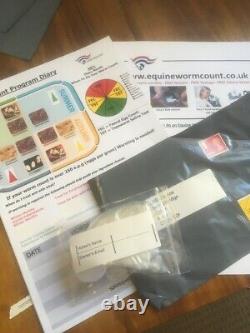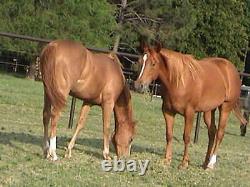
- Kit Brand New
- Brand
- Aftermarket Products (24)
- Am Autoparts (23)
- Ap Auto Parts (17)
- Bosch (18)
- Brakemotive (18)
- Buyaparts (17)
- Detroit Axle (26)
- Dewalt (32)
- Exedy (33)
- Ford (56)
- Gates (43)
- Luk (23)
- Makita (22)
- Milwaukee (19)
- Oe Quality (68)
- Racemmi (18)
- Rymec (61)
- Select Automotive (18)
- Supreme Suspensions (16)
- Voilamart (27)
- Other (3132)
- Clutch Kit Type
- Effect
- Items Included
- Type
- Air Filter (35)
- Cabin (17)
- Canister / Cylinder (13)
- Clutch Kit (118)
- Control Arm (12)
- Control Arm Kit (24)
- Conversion Kit (23)
- Electric (11)
- Enclosed Powered (13)
- Headlight Set (12)
- Kit (17)
- Kitchen Equipment (11)
- Service Kit (38)
- Sinks (13)
- Solar Panel Kit (11)
- Suspension (14)
- Timing Belt Kit (28)
- Timing Chain Kit (32)
- Timing Kit (30)
- Turbo Kit (32)
- Other (3207)
- Unit Type
Horse Faecal Equine Egg Count Kit, Worm count, Worming kit FREE RETURN POSTAGE







Lab Equine are passionate horse owners that know how important it is to keep our horses and ponies healthy, whether it is a happy hacker or a competition horse. Equine Worm and Egg Count Kits have been around for over 15 years, not many people knew anything about testing for worms.
A few people had tests done by their vet, but the typical worm control program consisted of giving a variation of wormer doses throughout the year, whether the horse needed them or not. Nowadays, testing for worms and only treating the horse if it is needed has become a popular best practice that vets and even wormer distributors support. What's in the box!
Single Equine Worm Count Kit. Return Stamped Addressed Envelope (only one per order). Find out how easy it is to do a worm egg count and run an efficient worming programme using only the wormers your horse really needs. What is a worm count?
A worm count is really a worm egg count (also known as a faecal egg count). A small sample of horse manure (about a desert spoon full) is prepared and mixed into a solution of Zinc Sulphate examined under the microscope to find out how many worm eggs are present. You cannot see them with the naked eye. We test each sample twice to determine the egg count. By using this method to measure your horses worm burden. It might be the case that he may not have worms at all.He may have many more than expected. Use the results to devise your worming program. A worm count will allow you to treat your horse's worm control in a knowledgeable way. Whatever worming programme you follow a worm count should be a vital part of your approach, here's how. Here we answer some of your common questions.
Why should I use worm egg counts in my worming programme? If you are using a full programme you can make sure it is effective. In many cases you will be able to replace some wormer doses with counts, cutting down on the amount of chemicals going into your horse and out onto the pasture. You can target the correct wormers at the horse who needs them instead of wasting and guessing the doses on horses that may not need worming in the first place.I've heard that worm egg counts don't show all the worms though? Nevertheless a worm count is still a very useful tool.
Encysted stages of redworm are not mature so don't lay the eggs which are counted in the manure sample. It is important to treat with an effective product in the winter months then you can rely on your worm count results over the next season.
Tapeworm eggs often appear in dung samples but a worm egg count is not reliable for detecting tapeworm. I'm unsure whether to give up regular worming, I'd rather be safe than sorry. Following a complicated and expensive worming programme does not guarantee that your horse will be free of worms. We test many horses that have been on worming programmes and still have medium or high worm count results.Increased resistance to some wormers means that they may not be effective for your horse. This can only get poorer in years to come and there are no new worming drugs.
Regular worm counts can establish parasite problems, sometimes only affecting one horse in a herd, so they can be accurately treated. Isn't it complicated to do?We provide a step by step guide that will make it easy to follow! More and more people are using this system for health and economical reasons! This is an important question. The main aim of using a worm count programme is to have a healthier horse with a well managed worming regime but one of the other benefits is that it is usually a cheaper option. When you first start there may be a period when you need to both count and give a wormer for instance when a horse proves to have a parasite problem.
Using tests means that the problem is recognised and treated accordingly. What does my result mean? For each horse on the result sheet there will be a number indicating the level of worm eggs found. It is very common for a result to come back as. If the count is less than 250 epg then it is a LOW count and your worming measures are working. If you are following a reduced worming plan you may still want to delay the next dose at this level. If the count is between 250 epg and 1200 epg it is a MEDIUM count and the horse needs worming. If the count is more than 1200 epg it is a HIGH count, the horse needs worming and the worming programme needs attention. Which worms are covered by the test?Usually your result will say STRONGYLE EGGS. This is redworm, the most common parasite that affects horses. We may find TAPEWORM EGGS, though these don't always show on a count. Your horse could still have tapeworm even if no eggs are seen.
This is roundworm, usually only a problem in foals and previously neglected horses. IF YOU ARE CONCERNED ABOUT YOUR HORSE'S CONDITION, PLEASE CONSULT YOUR VET. This item is in the category "Sporting Goods\Equestrian\Horse Feed & Supplements\Horse Supplements". The seller is "lab-equine" and is located in this country: GB.
This item can be shipped to United Kingdom.
- MPN: 30 x horse kit
- Sub-Type: Worm Count Kits
- Country/Region of Manufacture: United Kingdom
- Brand: LAB Equine

